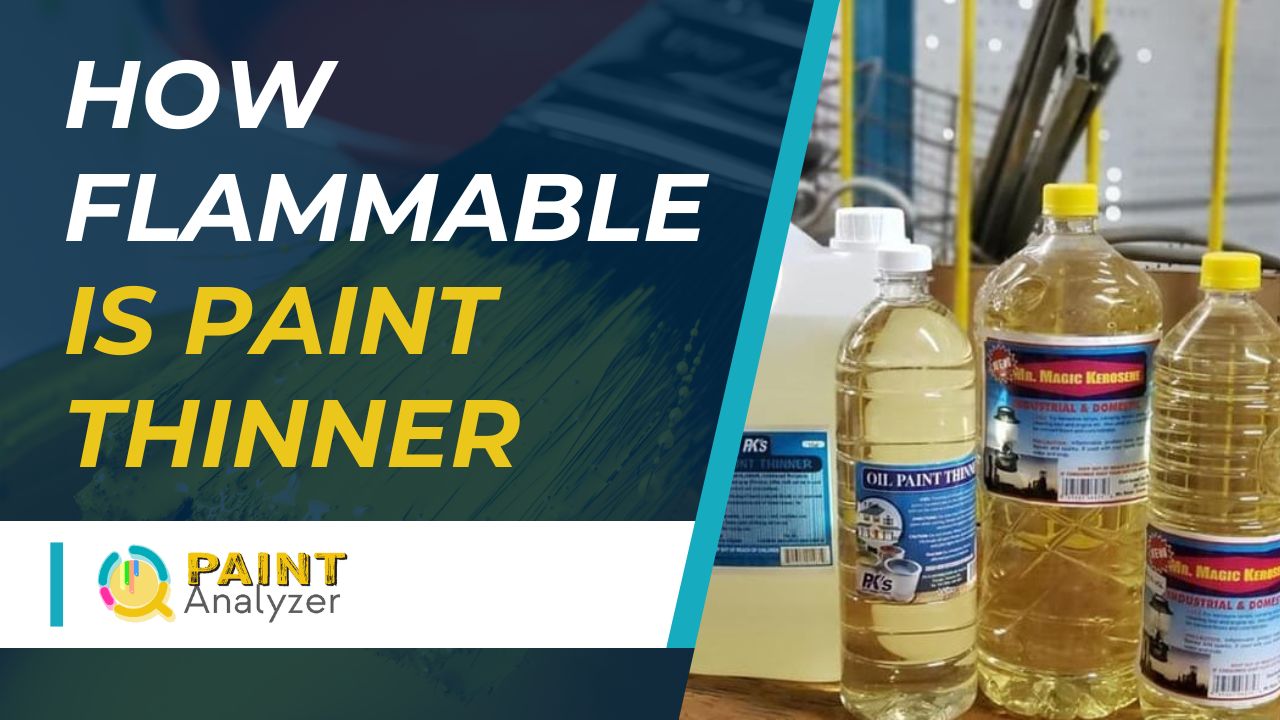If you’re a DIY enthusiast, you must know the importance of paint thinner. It’s a popular solvent used to thin oil-based paints and clean brushes. However, it’s also highly flammable, which raises the question: how flammable is paint thinner?
Paint thinner is an extremely flammable solvent, according to the Occupational Safety and Health Administration (OSHA). Its flashpoint, typically around 104°F (40°C), indicates the temperature at which it can ignite.
It is composed of volatile organic compounds (VOCs), such as toluene, acetone, and xylene, which can readily combust when combined with air in specific concentrations.
But don’t panic just yet. Proper safety precautions allow you to use paint thinner safely and without incident. In this article, I’ll answer some often asked issues concerning paint thinner flammability and offer advice on how to use it safely. Let’s dive in!

What level of flammability does paint thinner possess?
Paint thinner, also known as mineral spirits, typically has a moderate flammability level. It is essential to handle and store paint thinner cautiously to minimize the risk of fire or other accidents.
Paint thinner is a volatile substance that is highly flammable and can ignite easily in the presence of an ignition source, such as an open flame, sparks, or heat.
The exact level of flammability can vary depending on the specific formulation and brand of paint thinner. However, as a general guideline, paint thinner is classified as a flammable liquid.
It has a low flash point, the minimum temperature at which it can release enough vapors to ignite in the air. The flash point of paint thinner is typically below room temperature, often around 40-60 degrees Fahrenheit (4-16 degrees Celsius).
What Makes Paint Thinner Flammable?
Before using paint thinner, it is crucial to understand that this chemical solvent is highly combustible. To better understand paint thinner’s flammability, let’s delve deeper into the scientific explanation behind it.
Volatile Organic Compounds (VOCs)
The primary reason paint thinner is flammable is due to volatile organic compounds (VOCs). These compounds are organic chemicals with a high vapor pressure at room temperature. When the vapor pressure of a substance exceeds a certain level, it can ignite and burn easily.
The most common VOCs found in paint thinner are toluene, acetone, and xylene. These chemicals are used in paint thinner because of their ability to dissolve and thin out paint, varnish, and lacquer. However, their high vapor pressure also makes them highly flammable.
Now let’s dive into the details of how each of these VOCs contributes to the flammability of paint thinner:
- Toluene: This VOC is commonly used as a solvent in paint thinner because it’s highly effective at dissolving paint and other coatings. However, it’s also highly flammable and can easily ignite if it reaches its flashpoint of 40.4°C (104.7°F).
- Acetone is another VOC commonly found in paint thinner, and it’s highly effective at dissolving various coatings. It’s also highly flammable, with a flashpoint of -18°C c.c, which means it can easily ignite even at room temperature.
- Xylene is a VOC commonly used in paint thinners and other solvents because of its strong solvent power. It has a flashpoint of around 32°C c.c, so it can easily ignite if exposed to an ignition source.
Flash Point
Another factor contributing to the paint thinner’s flammability is its low flash point. The flash point is the temperature at which a substance can produce enough vapor to ignite when exposed to a spark or flame. The flash point is typically between 40 to 60 degrees Celsius for paint thinner. This means that paint thinner can easily ignite even at room temperature if exposed to a spark or flame.
Mixing with Air
Paint thinner is also flammable because of its ability to mix with air. When paint thinner is exposed to the air, its VOCs evaporate and create a mixture with air that can easily ignite.
Is it Safe to Use Paint Thinner on Different Types of Paint Finishes?
When considering painting eggshell over semigloss finishes, it’s important to use the right paint thinner for the job. Different paint finishes require different thinners to ensure a safe and effective application. Always check the manufacturer’s guidelines and test on a small area before proceeding with the full project.
Can Hot Glue Cause Paint Thinner to Catch on Fire?
Hot glue strength and uses are well-known, but can hot glue cause paint thinner to catch on fire? When directly applied to paint thinner, hot glue can ignite due to its flammability. It’s important to handle both substances carefully and keep them away from heat sources to avoid any potential fire hazards.
Safety Precautions When Working with Paint Thinner
When working with paint thinner, it is essential to take proper safety precautions to prevent accidents and injuries. Here are some essential safety measures to keep in mind:
Wear Protective Gear
The first and foremost safety measure is to wear protective gear. This gear includes gloves, goggles, and respirators. Gloves prevent skin contact with paint thinner, goggles protect the eyes from splashes, and respirators help you avoid inhaling toxic fumes.
Work in a Well-Ventilated Area
Paint thinner releases harmful fumes that can cause respiratory problems. Therefore, working in a well-ventilated area is crucial, such as a room with open windows or a garage with the door open.
Keep Paint Thinner Away from Heat Sources
As mentioned earlier, paint thinner is highly flammable. Therefore, keeping it away from heat sources like open flames, heaters, and spark-producing tools is essential.
Store Paint Thinner Safely
Maintaining paint thinner in a cool, dry, and well-ventilated location is recommended when it is not in use. To prevent the risk of combustion, it should be kept away from all heat sources. Furthermore, ensuring the container is firmly sealed is critical to avoid evaporation loss.
Dispose of Paint Thinner Properly
Never dispose of paint thinner by pouring it down the drain or throwing it in the trash. Contact your local hazardous waste disposal facility for safe disposal.
What to Do in Case of Fire?
Despite taking all necessary precautions, accidents can happen. If a fire does break out while working with paint thinner, it is essential to act quickly and appropriately to minimize damage and avoid injury. Here’s what to do in case of fire:
Evacuate the area immediately
As soon as a fire starts, evacuate the area immediately. Alert others and make sure everyone is out of harm’s way.
Call for help
Once everyone is safe, call the fire department. Provide them with the location and nature of the fire, and follow any instructions given to you over the phone.
Do not attempt to extinguish the fire
Trying to put out a fire caused by paint thinner is extremely dangerous. The best action is to wait for the fire department to arrive and let them handle the situation.
Stay clear of the area
Do not return to the area until the fire department gives you the all-clear. Even if the fire appears to be out, there could still be smoldering embers that could ignite again.
Seek medical attention if necessary
If you or anyone else has been injured during the fire, seek medical attention immediately. Inhaling paint thinner fumes or sustaining burns can be severe and require medical attention.
Conclusion
Paint thinner is highly flammable and requires proper handling and storage to avoid accidents or fires. Understanding the potential dangers of paint thinner and taking all necessary safety precautions when working with it is crucial.
Always ensure proper ventilation, use protective gear, and avoid smoking or using any open flames near the area. In a fire, it is essential to remain calm and follow the appropriate steps to extinguish the flames safely.
With proper knowledge and caution, you can safely use paint thinner for your painting projects without any incidents. The paramount consideration in tasks involving combustible substances is the assurance of safety at all times.
